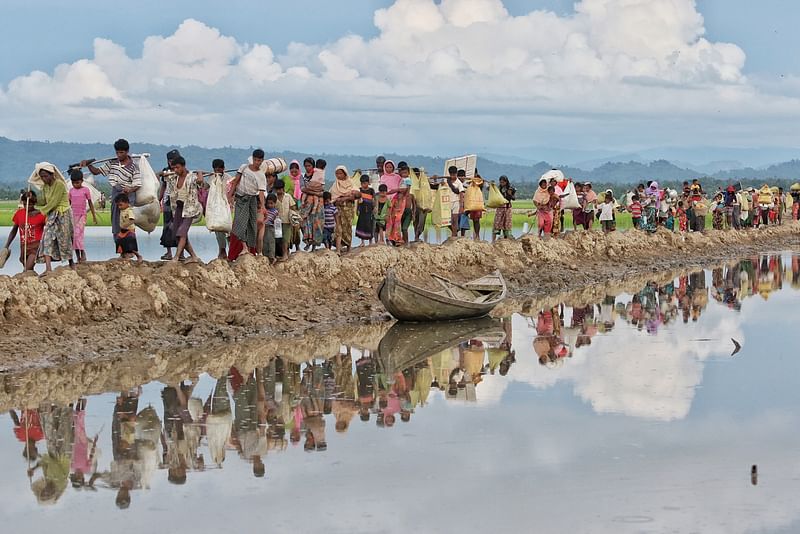536,000 Rohingyas fled to Bangladesh since August: ISCG

Rohingyas from Myanmar's Rakhine state continue to crossing border to seek safety in Bangladesh putting the number of new arrivals at 536,000, according to latest data.
Inter Sector Coordination Group (ISCG) released the data saying 536,000 new arrivals are reported as of 11 October, said the International Organization for Migration (IOM) on Thursday night.
According to IOM Needs and Population Monitoring, UNHCR and other field reports, cross border movement of over 14,000 newly arrived refugees has been verified in the past two days.
This report is produced by ISCG in collaboration with humanitarian partners and covered 10-11 October while the next report will be issued on 17 October.
Their arduous journeys from Rakhine villages to the border with Bangladesh took from 2-16 days, and that most Rohingya people were forced to pay between Tk 5,000-10,000 each to cross the Naf River by boat, according to a UN report.
"Many without any means had to walk across to the border," said the UN report, released on Wednesday, which is based on some 65 interviews with individuals and groups.
UNICEF representative in Bangladesh Edouard Beigbeder has said, "Disease outbreak is a real and present danger for the camp dwellers and host population. We immediately need to step up sanitation coverage there."
Beigbeder said there are already reports of water-borne diseases from the health centres in the camps.
New latrines will be constructed in the Rohingya camps and settlements in Cox's Bazar district to provide sanitation coverage to some 250,000 people, averting a major disease outbreak, according to the United Nations Children's Fund (UNICEF).
UNICEF and the ministry of disaster management and relief of Bangladesh agreed that the Bangladesh Armed Forces Division will construct 10,000 latrines in Cox's Bazar as quickly as possible at a cost of $1.5 million.
The latrines, at an estimated cost of $147 each, will also be regularly disinfected through spraying chlorine solution so that these do not become sources of contamination.
UNICEF, the Department of Public Health and Engineering, and water and sanitation sector partners are also implementing an accelerated programme of building latrines for the refugees in the camps in two sub-districts of Cox's Bazar district.
Earlier, UNICEF and its health sector partners launched a massive oral cholera vaccination campaign for 650,000 people in Ukhiya and Teknaf sub-districts of Cox's Bazar - mobilizing 900,000 doses of cholera vaccines to protect newly arrived Rohingyas and the host community from a cholera outbreak.